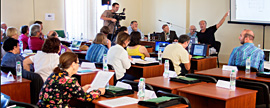Third Symposium of the ICTM Study Group for Multipart Music was organized from September 12–16 2013 Budapest, Hungary. Local Organiser were: Institute for Musicology, Research Centre for the Humanities, The Hungarian Academy of Sciences Budapest, Hungary.
Themes:
1. Scholarly terminology and local musical practice. 2.The role of educated musicians and missionaries in local music practices. 3. Individualists in company
- Anda Beitāne (Latvia). Who Influences Whom? Educated Musicians and Their Influence on Local Multipart Music Practice in Eastern Latvia.
- Gianni Belluscio (Italy) and Oliver Gerlach (Germany). Multipart Singing of the Italo-Albanian Communities in Calabria.
- Enrique Càmara de Landa (Spain). A Musician Operating in Several Areas: Roberto Scarlato and the Vocal and Instrumental Polyphony in Present-day Argentina.
- Fulvia Caruso (Italy). The “Canzonetta in lode alla Santissima Trinità” Between Tradition and Innovation.
- Jean-Jacques Castéret (France). The Royal 6th Tone’s Institutions of Transfer: Multipart Singing and Education in the Traditional Western Pyrenean Society.
- Anne Caufriez (Belgium). The Actual Practice of “Traditional” Music in Porto Santo Island (Madeira).
- Tamaz Gabisonia (Georgia). The Known Examples of Personal Influence on Georgian Musical Tradition.
- Larry Francis Hilarian (Singapore). The Use of Scholarly Terminology and Concepts in the Understanding Local Musical Practices, Through the Performance of the Malay-Lute (Gambus).
- Catherine Ingram (Australia). The Roles of Individual Singers within Kam People’s “Big Song” Choral Singing in Southwestern China.
- Eno Koço (UK/Albania). Music of the Albanian Orthodox Church and its Local Practices
- Katalin Lázár (Hungary). Polyphony in the Vocal Traditional Music of Peoples of Finno-Ugrian Languages.
- Wei-Ya Lin (Austria). The Relationship between the Practices of Traditional Singing and Church Hymns in the Society of Tao, an Indigenous Ethnic Group in Taiwan.
- Marco Lutzu (Italy). Shaping the Ritual. The Role of Individual Choices in the Definition of the Musical Structure of the Oro cantado.
- Ignazio Macchiarella (Italy). For Those Who Have Ears to Hear. Individual Signatures in Sardinian Multipart Singing.
- Zlata Marjanović (Serbia). The Ethnomusicologist at the Fieldwork: An Educated Outlander or a Compatriot-by-Music Practice?
- Renato Morelli (Italy). Christmas Carols in Northern Italy, Between Printed Sources and Oral Transmission. The Role of Saints, Monks, and Priests in the Diffusion of this Repertoire.
- Ulrich Morgenstern (Austria). Phonic Contrast, Harmonic Accents, Rhythm of Texture. Multipart Folk Instrumental Practice as a Challenge to Musicological Terminology.
- Ieva Pāne (Latvia). The Influence of Creative Persons on the Natural Course of Traditional Multipart Singing in Bārta Village.
- Panel “New Traditions” Invented by Educated Musicians, Scholars, and Missionaries.
Paolo Bravi (Italy). Training, Cultural Values and the Shaping of the Voice in the Sardinian A Sa Nuoresa Choirs.
Cristina Ghirardini (Italy). Francesco Balilla Pratella and Choral Singing in Romagna.
- Gerda Lechleitner (Austria). Zulu Recordings from 1908: A Conflict between “Tradition” and “Modernity”.
- Nona Lomidze (Austria/Georgia). Georgian Folk Music – Changes in Tradition Through Professionalization?
- Žanna Pärtlas (Estonia). Between Local and International, Folk and Scholarly Terminology. The Case of Traditional Russian Multivoiced Singing.
- Daiva Račiūnaitė-Vyčinienė (Lithuania). An Educational Impact on the Practice of Sutartinės in the 20th Century.
- Guido B. Raschieri (Italy). The Multipart Music in the Contemporary Vocal and Instrumental Tradition of North-West Italy.
- Pál Richter (Hungary). Monophony in Multipart Instrumental Hungarian Folk Music.
- Kata Riskó (Hungary). Towards Multipart Music – Embourgeoisment and New Musical Ideals in the North-western Region of Hungarian Folk Music.
- Constantin Secară (Romania). Romanian Christmas Carols in Byzantine Style. The Tradition of Monody and Ison (Isokratema) between Written Sources and Oral Transmission.
- Lana Šehović-Paćuka (Bosnia and Herzegovina). Hungarian Composer Julius Major’s Bosnian Musical Adventure.
- János Sipos (Hungary). Traces of Multipart Music in Some Turkic-Speaking Communities.
- Lujza Tari (Hungary): Results of Researching Individuality in Hungarian Instrumental Folk Music.
- Amra Toska (Bosnia and Herzegovina). Etnoakademik: Reinterpretations of Musical Tradition.




